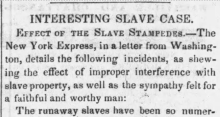"Interesting Slave Case. Effect of the Slave Stampedes," Nashville (TN) Daily Union, August 20, 1850
INTERESTING SLAVE CASE.
EFFECT OF THE SLAVE STAMPEDES.––The New York Express, in a letter from Washington, details the following incidents, as shewing the effect of improper interference with slave property, as well as the sympathy felt for a faithful and worthy man:
The runaway slaves have been so numerous of late, in these parts, under the instigations of the abolitionists, here and elsewhere, that the owners of this species of property have become very much alarmed, and hence are disposed to remove them to safer parts of the United States, or to sell them to slave traders. A cruel incident of this kind is exciting great sympathy here at present. The family of William Williams, the coachman of Presidents Polk, Taylor, and Fillmore, were suddenly, on Friday morning, seized by a slave trader, and taken from their home, in this city, off to Baltimore, to be sent to New Orleans.–– His wife, over fifty years of age, three daughters, and three small grand children, were thus snatched from him in an hour, to a fate worse than death; to be sold South to the highest bidder, and separated from him and each other. The poor man wrung his hands, rolled on the ground, was nearly crazed in fact, by the dreadful parting. After many years of toil, he very recently purchased his own freedom, but his family were owned by some one in N. Orleans. The President, feeling deeply for his distress, gave him money and let him go to Baltimore, to see them again. Williams found the trader would take the sum of $3,200 for them, and returned with the hope of raising that amount here to redeem them. A petition was drawn up, and to-day circulated about the city and House of Representatives, setting forth the fact, and asking for assistance, which was promptly rendered, that the prospect is, in the language of Williams himself, 'very fair.'
The President, Mr. Webster, Gen. Scott, and a number of Senators, members and citizens have contributed sums from 5 to $50. Mr. Corcoran gave $200 which was the price asked for the aged wife, and he made her "free" at once. Besides doing this, Mr. Corcoran has purchased one of the women, who has lived in his family for some years. Mrs. Com. Patterson another, and Mrs. Gen. Towson a third, who lived with her from some years past. So the children, for whom $1,500 were asked, only remained to be purchased by their grandfather--and he is in a fair way of raising this money.
In all probability, these slaves would have been permitted to have remained here undisturbed for years if all sense of security had not been destroyed by the temptation held out to run away. Every man who owns this kind of property now thinks of hurrying it off further south. Thus though the District of Columbia may be made "Free Soil," by the Abolitionists, it will be amid such scenes as I have described above, and amid such suffering as I picture.

